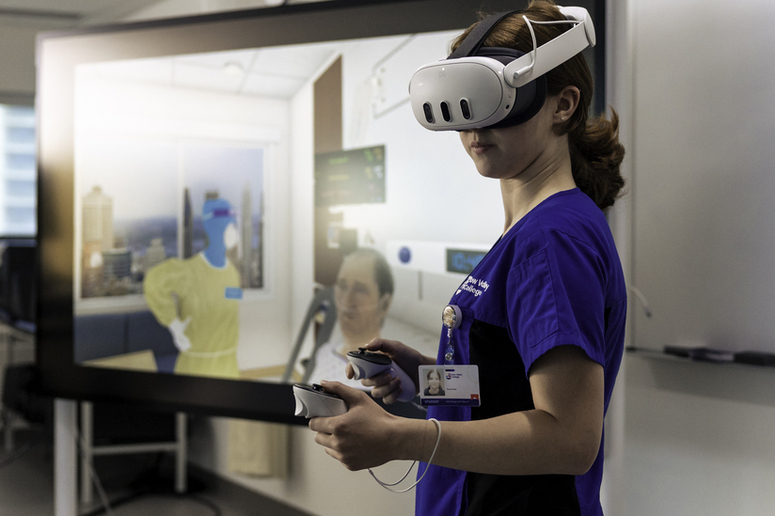How to Reduce Nursing Student Anxiety in Simulations: Strategies for Educators

Table of Contents
Name of the heading 1
1- Start your table with the syntax {start-table}
2 - Add an H3 Heading to create a new column (this will be the column title)
3 - List cells as bullet points in a List element
4 - End your table with the syntax {end-table}
Nursing simulation is a vital component of healthcare education, offering students hands-on experience in a controlled, safe environment. However, despite its benefits, many students experience high levels of anxiety during simulations. Managing student anxiety in nursing simulation is critical to ensuring learners are engaged, confident, and successful in transferring skills to real-world clinical settings.
Learn more about the causes of simulation-related anxiety, effective strategies to reduce stress, and the role of emerging technologies like virtual reality (VR) in creating supportive learning environments.
What Causes Simulation Anxiety?
Simulation anxiety is a multifaceted issue influenced by psychological, educational, and interpersonal factors. For nursing students, the pressure to perform correctly in front of peers and faculty, fear of making mistakes, and unfamiliarity with simulation technology can all heighten stress levels.
Other contributors to simulation anxiety include:
- Perceived judgment from instructors and peers
- Time constraints during critical thinking and decision-making
- High-fidelity scenarios that mimic real-life emergencies
- Unclear expectations or inadequate preparation
Understanding what causes simulation anxiety is the first step in developing tailored interventions to support student well-being and performance.
How Can Faculty Support Student Confidence in Simulations?
Confidence and anxiety often have an inverse relationship—when one rises, the other falls. Supporting student confidence in simulations involves both preparation and emotional support.
Key strategies include:
- Pre-briefing sessions that clearly outline objectives, expected behaviors, and simulation flow
- Formative assessments rather than high-stakes grading in early simulations
- Creating a psychologically safe environment, where mistakes are framed as learning opportunities rather than failures
Faculty and peers play an essential role in confidence-building. Encouraging words, constructive feedback, and open-ended questions can foster a sense of capability and control among students.
What Are Best Practices for Reducing Simulation Anxiety?
Adopting simulation anxiety best practices requires a holistic approach that combines curriculum design, instructional technique, and student support services.
Recommended practices include:
- Gradual exposure to increasing levels of simulation complexity
- Structured orientation programs for simulation labs and equipment
Normalization of anxiety, where faculty share that nerves are expected and manageable - Use of mindfulness and breathing exercises before simulations
Simulation leaders should also prioritize learner-centered approaches, recognizing that students come with varied experiences and coping mechanisms.
What Interventions Can Faculty Use for High-Stakes Simulations?
High-stakes simulations—such as those tied to grading, licensure preparation, or clinical evaluations—can be particularly anxiety-inducing. Faculty interventions for high-stakes simulations can make a significant difference in student outcomes.
Effective interventions include:
- Transparent evaluation rubrics so students know exactly how they’ll be assessed
- Ongoing feedback loops, where students receive input throughout the simulation cycle, not just at the end
- Presence of supportive faculty or mentors in the room, who observe with empathy rather than judgment
Faculty should also avoid "gotcha" scenarios that are designed to trick students. Instead, simulations should challenge students appropriately while reinforcing their learning.
How Can Faculty Reduce Student Stress in Nursing Labs?
Simulation labs often replicate the sensory and procedural aspects of clinical settings, which can be intimidating. Reducing stress in nursing labs involves both environmental and procedural adjustments.
Simple yet effective changes include:
- Soothing lighting and noise levels
- Organized and clutter-free simulation stations
- Opportunities for students to explore equipment prior to formal simulations
- Use of guided walkthroughs before full immersion
By creating a calm and orderly physical space, nursing programs can help students feel more in control, thereby reducing anxiety.
How Can Faculty Help Nursing Students Manage Simulation Stress?
Faculty members are the most influential figures in shaping student perception of simulation. What faculty strategies help students cope? The answer lies in empathy, structure, and responsiveness.
Helpful strategies include:
- Pre-simulation coaching, where faculty discuss coping techniques and answer student concerns
- Mid-simulation check-ins, especially during long or complex scenarios
- Post-simulation support, including both group and individual debriefing
- Modeling calm behavior, which helps regulate student stress through social mirroring
When faculty are trained not just in simulation pedagogy but also in emotional intelligence and mental health first aid, they are better equipped to guide students through simulation-related anxiety.
How Should Faculty Debrief to Reduce Simulation Anxiety?
Debriefing is one of the most impactful components of simulation-based education. But are there debriefing best practices for managing anxiety?
Yes, and they include:
- Structured debriefing models like PEARLS or the Debriefing for Meaningful Learning (DML) framework
Student-led reflection, which encourages ownership of learning and fosters empowerment - Nonjudgmental language, focusing on improvement rather than criticism
- Inclusion of emotional check-ins, allowing students to express how the simulation made them feel
Debriefings that prioritize emotional processing alongside clinical review create lasting learning and help students develop resilience.
How Do VR Simulations Reduce Student Stress?
Virtual reality (VR) offers immersive, repeatable scenarios that can significantly aid in stress reduction for nursing students. The deeply immersive nature of VR creates a unique psychological experience where students become so focused on the clinical scenario that they mentally tune out their surroundings, including observers who may be present.
Some proven VR simulation stress reduction strategies include:
- Controlled environment factors that eliminate common clinical learning fears, including the inability to physically harm a patient, break equipment, or waste supplies
- Repetitive exposure to scenarios that build familiarity and reduce the fear of the unknown, particularly for rare or high-risk clinical events that would be too anxiety-inducing to practice with high-fidelity manikins
- Prep functionality where VR serves as preparatory practice before encountering similar situations in traditional simulation or clinical settings, reducing the compound anxiety of learning both clinical skills and simulation lab procedures simultaneously
- Immersive first-person perspective that creates a psychological sense of privacy and focus, even when instructors or peers are observing the session
VR also enables students to practice complex clinical events in a risk-free environment where mistakes have no real-world consequences, which builds resilience and confidence over time. The ability to try different approaches to the same scenario and experience the full clinical progression without time pressure from actual patient needs helps students build mental models and clinical judgment before higher-stakes practice.
Can Repeated VR Practice Reduce Anxiety?
Repetition is a known antidote to anxiety. So, can repeated VR practice reduce anxiety in nursing students? Research suggests a resounding yes.
With repeated VR practice, students:
- Become more familiar with clinical scenarios and decision-making processes, transforming novel situations into recognizable patterns
- Reduce uncertainty by encountering the same types of clinical presentations multiple times in varied contexts
- Gain confidence in their abilities through mastery experiences, which diminishes fear of failure
- Improve both technical and soft skills in an environment where the immersive technology acts as a buffer between learner performance and observer judgment
- Develop procedural memory that transfers to real clinical settings with less associated anxiety
In essence, repeated exposure in VR environments turns novelty into routine, which significantly lowers the physiological and psychological responses associated with stress. The ability to practice privately before observed scenarios also gives students control over their learning trajectory.
Final Thoughts
Managing student anxiety in nursing simulation is not just about reducing stress—it’s about creating a foundation for lifelong clinical confidence. From innovative VR applications to thoughtful faculty interventions and best-practice debriefing, nursing educators have a powerful set of tools at their disposal.
By acknowledging the challenges students face and implementing targeted strategies, nursing programs can transform simulations from anxiety-provoking events into empowering learning experiences that truly prepare future nurses for the demands of healthcare.
FAQs
Heading 1
Heading 2
Heading 3
Heading 4
Heading 5
Heading 6
Lorem ipsum dolor sit amet, consectetur adipiscing elit, sed do eiusmod tempor incididunt ut labore et dolore magna aliqua. Ut enim ad minim veniam, quis nostrud exercitation ullamco laboris nisi ut aliquip ex ea commodo consequat. Duis aute irure dolor in reprehenderit in voluptate velit esse cillum dolore eu fugiat nulla pariatur.
Block quote
Ordered list
- Item 1
- Item 2
- Item 3
Unordered list
- Item A
- Item B
- Item C
Bold text
Emphasis
Superscript
Subscript
Simulation anxiety stems from fear of making mistakes in front of peers and faculty, unfamiliarity with simulation technology, and pressure to perform in high-fidelity scenarios. Time constraints, unclear expectations, and perceived judgment from instructors also contribute to heightened stress levels during simulations.
Faculty can reduce simulation anxiety through pre-briefing sessions that clarify expectations, creating psychologically safe environments where mistakes are learning opportunities, and providing transparent evaluation rubrics. Additional strategies include offering equipment orientation, modeling calm behavior, and using structured debriefing frameworks that include emotional check-ins.
Best practices for high-stakes simulations include providing transparent evaluation rubrics, ongoing feedback throughout the simulation cycle, and supportive faculty presence focused on empathy rather than judgment. Faculty should avoid "gotcha" scenarios and instead design simulations that appropriately challenge students while reinforcing learning objectives.
Yes, VR significantly reduces nursing student anxiety by creating immersive environments where students can practice without fear of harming patients or wasting supplies. The technology allows for repeated exposure to rare or high-risk scenarios, builds familiarity through repetition, and serves as preparatory practice before traditional simulations, all while creating a psychological buffer between learner performance and observer judgment.
Debriefing reduces simulation anxiety by using structured frameworks like PEARLS or DML that prioritize nonjudgmental language and emotional processing alongside clinical review. Effective debriefing includes student-led reflection, emotional check-ins where students can express their feelings, and a focus on improvement rather than criticism, all of which build resilience and lasting learning.
Explore more

Why Academic-Practice Partnerships are the Future of Nursing
Learn how VR-enhanced Academic-Practice Partnerships eliminate transition shock, achieve 100% retention, and save health systems millions in turnover costs.

Beyond Pass Rates: Why Clinical Judgment Is the Measure of Nursing Readiness
Discover why clinical judgment, not just pass rates, indicates nursing workforce readiness. Learn how AI-enhanced VR simulation builds practice-ready graduates.

Why Q1 Decisions Determine Your Nursing Workforce Pipeline
Why January–March decisions shape nursing workforce capacity, readiness, and retention, and how early action strengthens the pipeline.


